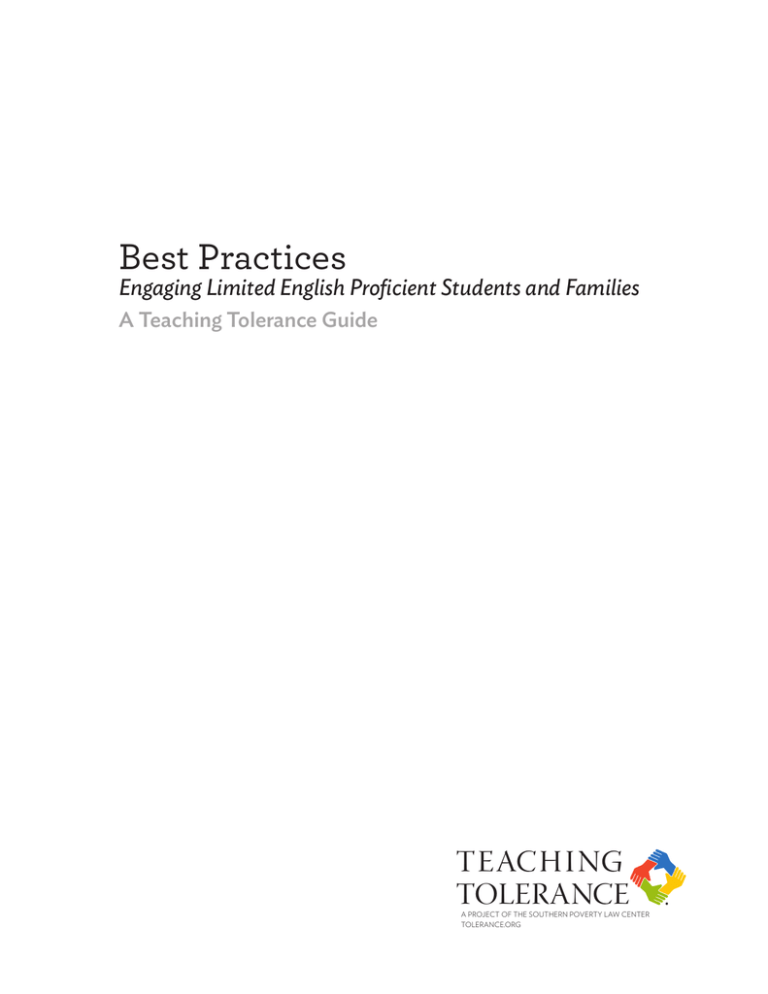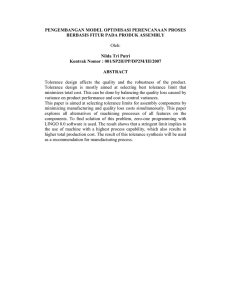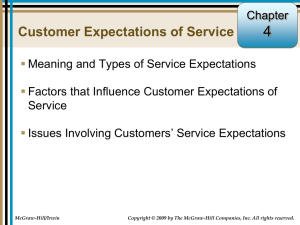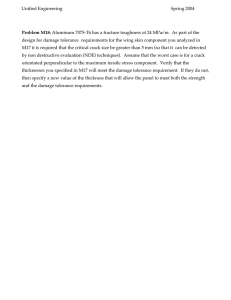Best Practices - Teaching Tolerance
advertisement

Best Practices Engaging Limited English Proficient Students and Families A Teaching Tolerance Guide TEACH I NG TOLERANCE A PROJECT OF THE SOUTHERN POVERTY LAW CENTER TOLERANCE.ORG TEACHING TOLERANCE A PROJECT OF THE SOUTHERN POVERTY LAW CENTER TOLERANCE.ORG Best Practices Engaging Limited English Proficient Students and Families A Teaching Tolerance Guide Introduction Fueled by two decades of historic immigration, American demographics are changing. Many school districts are often ill prepared to meet the needs of limited English proficient (LEP) students and families. This Teaching Tolerance booklet points administrators to best practices in the effort to create a supportive learning environment for all students. Here, we provide guidance for creating a comprehensive communication plan that puts LEP parents on equal footing with English-speaking parents. Our tips will help you steer clear of discrimination during student registration and create a leadership checklist to help your staff make sure the school environment is welcoming to English language learners (ELLs) and their families. Background In 2011, Durham Public Schools ELL students and their LEP parents contacted the Southern Poverty Law Center (SPLC) seeking legal help. They complained about limited access to interpreters, untranslated school documents and a general climate of exclusion. The SPLC agreed to work on behalf of more than 6,000 students and their families affected by the North Carolina school district’s policies. Durham Public Schools eventually entered into a voluntary resolution agreement with the United States Department of Education’s Office for Civil Rights outlining a plan of action to create a school environment that nurtured every child, regardless of English language ability. As a project of the SPLC, Teaching Tolerance is disseminating these best practices to districts across the United States. They are intended to help administrators create inclusive school climates. 2 TEACHING TOLERANCE A PROJECT OF THE SOUTHERN POVERTY LAW CENTER TOLERANCE.ORG Best Practices Communication Parents depend on basic school communications— report cards, bus schedules, permission slips—to stay involved in their children’s education. When a school fails to provide translation support to LEP families, these lines of communication can break down. GET STARTED Have translated forms on hand. ƷɆɆ$*#!Ɇ+"Ɇ .!//Ɇ+.Ɇ!(!,$+*! ƷɆ01 !*0ɆɆ% %*#Ɇ1/ ƷɆ!/+*Ɇ"+.Ɇ/!*! ƷɆ!-1!/0Ɇ"+.Ɇ+*"!.!*! ƷɆ.(5Ɇ%/)%//( ƷɆɆ+1Ɇ*Ɇ +3*(+ ɆɆ/),(!Ɇ++'(!0Ɇ+"Ɇ0.*/(0! Ɇ%*"+.)0%+*Ɇ* Ɇ+))+*Ɇ +1)!*0/Ɇ0Ɇ tolerance.org/translated-school-forms • Develop a written communications plan to ensure timely and effective communication with LEP parents. • Maintain a list of LEP parents who require languages other than English and make this list available to all staff members. • Notify LEP parents annually that free translation and interpretation services are available and explain how to request these services. A multi-language poster by the office explaining the resources available to LEP families can simplify communication. • Provide free interpretation and translation services to LEP parents at parent-teacher conferences, meetings with the school principal and special education meetings. • All parent notices (e.g., registration/enrollment forms, emergency notification cards, report cards, bus schedules, field trip permission forms, privacy policies and class schedules) should include appropriate translations. • Train staff to effectively communicate with LEP parents—when and how to obtain qualified language assistance, use of interpreters when staff receive or make calls to language-minority individuals, and applicable recordkeeping procedures. School Climate Perhaps your school has had a sudden change in demographics that has led to tension, or maybe ethnic hostility is an old problem. Either way, a strong—and evolving—anti-bullying policy can go a long way towards creating a learning environment that nurtures all of your students. • Disseminate the schools’ anti-bullying policy— including a section on national-origin-based harassment—to all staff, students, parents and community members at the start of the school year. Don’t forget to print it in multiple languages. • Administer an annual student survey on school climate—such as Teaching Tolerance’s School Climate Survey on tolerance.org—and use the results 3 GET STARTED Build a strong relationship with the community. ƷɆɆ *2+(2!Ɇ")%(%!/Ɇ%*Ɇ!2!*0/Ɇ/1$Ɇ/Ɇ!$%*#Ɇ +(!.*!Ə/Ɇ%4Ɇ 0Ɇ,Ɇ0Ɇ1*$Ɇ5Ɇ0+Ɇ.!'Ɇ +3*Ɇ1(01.(Ɇ..%!./Ɓ ƷɆɆ*+1.#!Ɇ0!$!./Ɇ0+Ɇ)'!Ɇ,!.%+ %Ɇ$+)!Ɇ 2%/%0/Ɓ ƷɆɆ *2%0!Ɇ")%(%!/Ɇ0+Ɇ/$.!Ɇ0$!%.Ɇ1(01.!/Ɇ3%0$Ɇ /01 !*0/Ɇ!%0$!.Ɇ%*Ɇ0$!Ɇ(//.++)Ɇ+.Ɇ0ɆɆ/,!%(Ɇ "0!./$++(Ɇ!2!*0Ɓ ƷɆɆ+1Ɇ*Ɇ +3*(+ Ɇ!2!.50$%*#Ɇ5+1Ɇ*!! Ɇ0+Ɇ $+/0ɆɆ%4Ɇ 0Ɇ,Ɇ0Ɇ1*$Ɇ5Ɇ!2!*0Ɇ0ɆɆ tolerance.org/mix-it-up/what-is-mix TEACHING TOLERANCE A PROJECT OF THE SOUTHERN POVERTY LAW CENTER TOLERANCE.ORG of the survey to identify and address issues related to harassment, including national-origin-based harassment. Again, be sure to provide the survey in multiple languages. • Hold community meetings with interpreters present at least twice each year to provide information regarding registration/enrollment and communication services and to receive input from LEP parents and community members. • Develop cultural sensitivity training for all instructional staff, cafeteria staff, bus drivers, school office staff and school-level administrators. Student Registration Even inadvertent discrimination can discourage parents from enrolling their children. Ensure that school publications, policies, practices and procedures are equally inviting to all parents by avoiding these common registration missteps. • Registration and enrollment forms should not request or require information regarding a student’s, parent’s or guardian’s citizenship or immigration status. • Registration and enrollment materials should not state or imply that a student or guardian must provide a passport or any other immigration-related document as a form of identification. • Any request for a student’s, parent’s or guardian’s social security number should clearly state that disclosure is voluntary and explain both why the number has been requested and how it will be used. GET STARTED Hold an information session for families before registration begins. ƷɆ2!Ɇ%*0!.,.!0!./Ɇ,.!/!*0Ɓ ƷɆɆ4,(%*Ɇ5+1.Ɇ.!#%/0.0%+*Ɇ,.+!//Ɇ%*Ɇ !0%(Ɓ ƷɆɆ//1.!Ɇ,.!*0/Ɇ0$0Ɇ0$!Ɇ/$++(Ə/Ɇ+*(5Ɇ#+(Ɇ%/Ɇ 0+Ɇ,.+2% !Ɇ0$!%.Ɇ$%( .!*Ɇ3%0$Ɇ*Ɇ+10/0* %*#Ɇ ! 10%+*Ɓ ƷɆɆ *"+.)Ɇ,.!*0/Ɇ+"Ɇ0$!%.Ɇ$%( .!*Ə/Ɇ.%#$0/Ɇ3%0$Ɇ +1.Ɇ +3*(+ (!Ɇ%(%*#1(Ɇ.+$1.!ƂɆƌ*Ɇ 101.+Ɇ/Ɇ.%((*0!ƃɆ(Ɇ !.!$+Ɇ !Ɇ/1Ɇ$%&+ƝɆ !Ɇ ,.!* !.Ɓƍtolerance.org/bilingual-childrens-rights RESOURCES Examining Your School’s Climate 0.0!#%!/Ɇ* Ɇ0++(/Ɇ"+.Ɇ//!//%*#Ɇ5+1.Ɇ/$++(Ə/Ɇ(%)0! tolerance.org/activity/examining-your-schools-climate Inviting Engagement 0.0!#%!/Ɇ"+.Ɇ!00!.Ɇ/!.2%*#Ɇ %2!./!Ɇ,.!*0Ɇ,+,1(0%+*/Ɇ tolerance.org/activity/inviting-engagement Teaching Diverse Students School Survey //!//Ɇ3$!0$!.Ɇ+* %0%+*/Ɇ%*Ɇ5+1.Ɇ/$++(Ɇ/1,,+.0Ɇ0!$%*#Ɇ0$0Ɇ .!//!/Ɇ0$!Ɇ*!! /Ɇ+"Ɇ((Ɇ/01 !*0/Ɇ%*Ɇ.%((5Ɇ* Ɇ!0$*%((5Ɇ %2!./!Ɇ(//.++)/Ɓ tolerance.org/tdsi/schools-survey Translated School Forms +3*(+ (!Ɇ!4),(!Ɇ"+.)/Ɇ%*Ɇ,*%/$Ɇ* Ɇ*#(%/$ tolerance.org/translated-school-forms Enhancing Teachers’ Cross-Cultural Communication Skills !0$+ /Ɇ"+.Ɇ !2!(+,%*#Ɇ0!$!./ƏɆ%(%0%!/Ɇ0+Ɇ!*##!Ɇ%*Ɇ.+//Ɩ .!Ɇ%*0!.0%+*/Ɇ3%0$Ɇ")%(%!/Ɓ tolerance.org/tdsi/asset/enhancing-teachers-cross-cultural-commun 4 Diversity Responsive Schools Ɇ,,!.Ɇ"+.Ɇ/$++(Ɇ(! !./Ɇ !/.%%*#Ɇ$.0!.%/0%/Ɇ+"Ɇ/$++(/Ɇ 0$0Ɇ.!Ɇ(%'!(5Ɇ0+Ɇ!Ɇ,.0%1(.(5Ɇ/1!//"1(Ɇ%*Ɇ"%(%00%*#Ɇ0$!Ɇ (!.*%*#Ɇ+"Ɇ.%((5Ɇ* Ɇ!0$*%((5Ɇ %2!./!Ɇ/01 !*0/Ɓ tolerance.org/activity/diversity-responsive-schools



